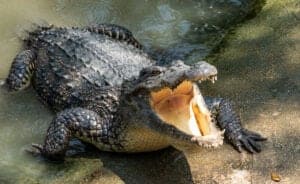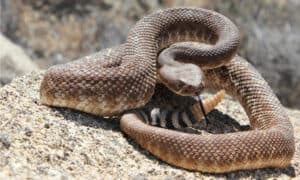Kingsnakes are adored for their bright, beautiful, and vibrant colors, mostly sporting red, black, and white cross bands. They are often kept as pets since they are docile in nature and easy to care for. A lot of people fear snakes for their predatory character and venom. Kingsnakes, however, are not known to be aggressive and do not possess any venom.
So are kingsnakes poisonous or dangerous? As constrictors, kingsnakes do not attack their victims or adversaries by injecting venom through their fangs but by coiling their long bodies around them and making a tight squeeze. Yet, since kingsnakes are neither long nor big enough to constrict people, they are not dangerous.
They are also not poisonous or venomous, making them one of the best and most popular pets. Despite this, kingsnakes are not helpless in the wild. They are even predators of venomous snakes because they can endure the toxins most venomous snakes have.
Do Kingsnakes Bite?
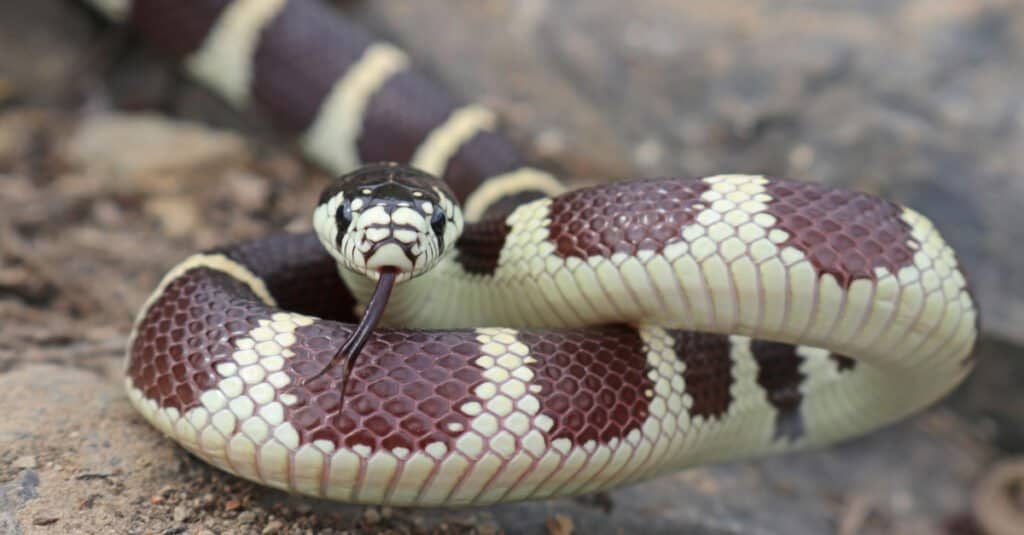
Though kingsnakes are non-venomous, they still bite.
©Creeping Things/Shutterstock.com
Kingsnakes do not have fangs as they are non-venomous. However, they still have teeth that are short and conical, which they use for biting. Kingsnakes are not known to be aggressive, and they will only bite when provoked. Often, kingsnakes bite when they feel threatened by a predator or an adversary. However, unlike most snake bites, kingsnake bites are not very painful and are not venomous. A kingsnake’s self-defense bite is often quick, as it releases its grip quickly.
Like most non-venomous snake bites, kingsnake bites can cause mild pain and swelling around the bite site. The bite wound may take some time to heal, but it wouldn’t cause any further complications, so any person bitten by a kingsnake should not worry about any danger.
Kingsnakes only bite when threatened, and this is often their last resort. When provoked, kingsnakes use a unique defense mechanism to release a nasty musk and shake their tails like rattlesnakes. When accidentally bitten by a kingsnake, you can clean the wound with warm soap and water and wait for the pain and swelling to subside in a few days.
In the wild, kingsnakes do not use their teeth to kill their prey. Instead, they use their long, slithering bodies to constrict and suffocate their victims. These North American natives are known to be one of the strongest constrictors on the planet, exerting about 180 mm Hg of pressure, which is significantly 60 mm Hg higher than that of a human being.
Snake experts claim that kingsnakes are snappier than other snakes when biting as they move fast. Most of the time, kingsnakes bite to warn their threat or adversaries to back off. So when they do this to humans, they only bite quickly, not to induce injuries but to threaten. It is easy to figure out that a snake has bitten you because even though they do this snappily and in a jiff, they still leave bite marks or puncture wounds.
For most venomous snakes, the bitten victim often feels effects from the poison that may include fever, headache, convulsions, or numbness. People bitten by kingsnakes may also feel one or two of these symptoms on rare occasions, but it happens primarily due to intense fear of the kingsnake bite.
Are Kingsnakes Dangerous to Humans?
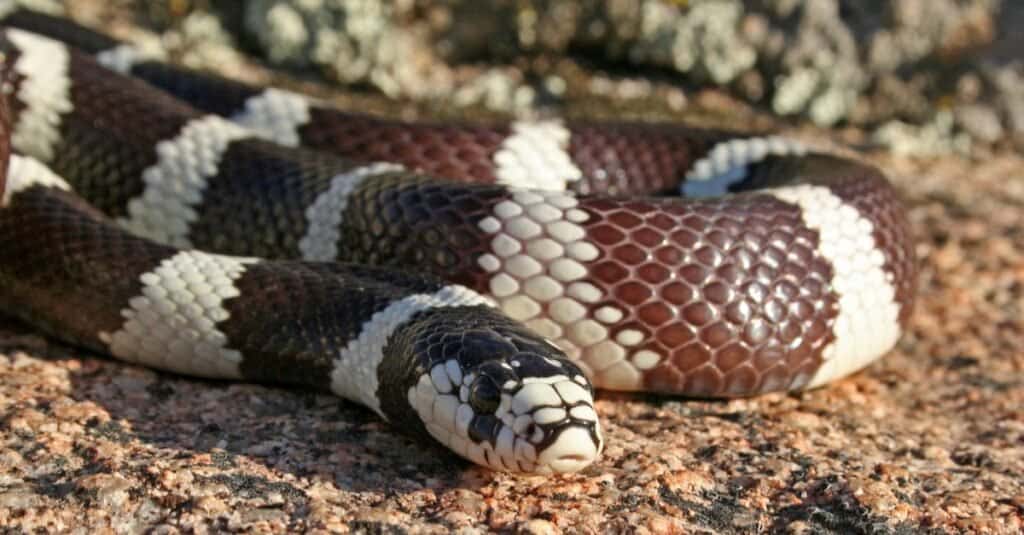
With the absence of fangs, kingsnakes are not harmful to humans.
©Creeping Things/Shutterstock.com
Kingsnakes are one of the best choices when it comes to pet snakes. Apart from their tantalizing vibrant colors, they are timid, docile, and easily tamed. Kingsnakes, like other species of snakes, tend to bite when frightened. Yet, since they do not have fangs like the python, kingsnake bites are far from harmful and may not cause any problems. As constrictors that typically grow to an average of 4 feet, kingsnakes are not aggressive and are not dangerous to humans.
Kingsnakes can only reach a maximum length of 6 feet or 182 centimeters, but most typically grow between 3 to 4.5 feet. Because of their size, they can’t kill human beings by constriction. And since they also do not possess any venom, harmful toxins, or poison in their bodies, they have no significant threat to human beings. Adult kingsnakes in the wild will often slither away rather than fight back or attack when encountered by humans. In captivity, it’s pretty much the same.
Are Kingsnakes Poisonous?
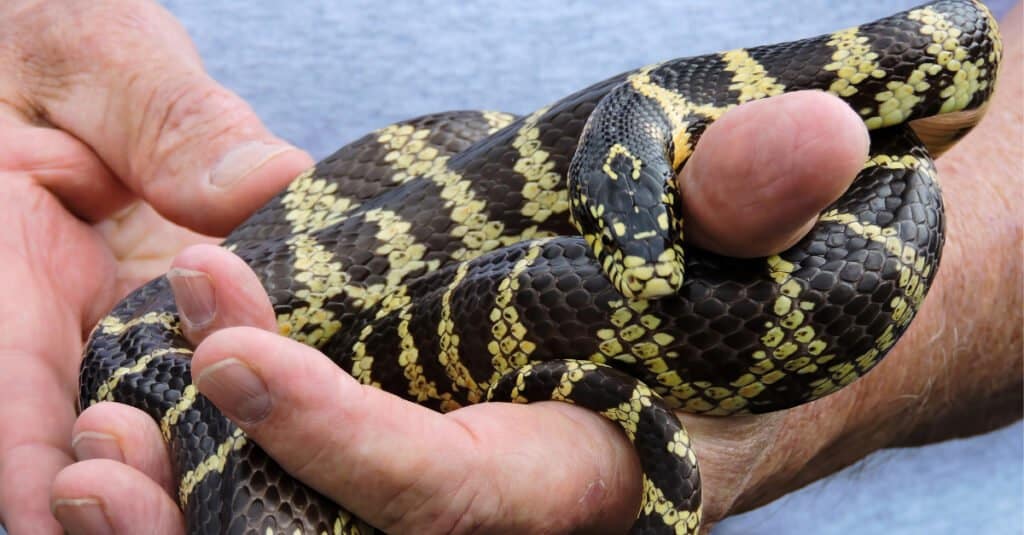
Kingsnakes are neither venomous nor poisonous.
©iStock.com/RobinOlimb
Kingsnakes are one of many non-venomous snakes on the planet, making them non-poisonous to humans. Although kingsnakes are somehow similar to coral snakes in terms of appearance, their defense mechanisms and hunting strategies are far different. While coral snakes are highly venomous and extremely dangerous to humans, kingsnakes are not. Kingsnakes are not poisonous and only rely on their strong constriction when hunting and killing their prey.
Kingsnakes can eat and kill other venomous snakes, like cottonmouths, copperheads, and rattlesnakes, as they are resilient to the toxins these snakes contain. This ability also helps kingsnakes survive in the wild. Generally, kingsnakes eat a variety of small mammals, including rodents and some species of birds and their eggs. They eat them by coiling around the animals, suffocating and crushing them with their bodies, and then eating them whole. Since they do not inject venom of any kind, their victims are not killed from their bite.
How to Avoid Kingsnake Bites
Adult kingsnakes do not often show aggression towards humans. When they are correctly handled, kingsnakes can be tamed well. However, kingsnakes may also give warning signs when stressed or uncomfortable. To avoid getting bitten by pet kingsnakes, you should observe their behavior. They may shake their tails and open their mouths while breathing to signal that they are uncomfortable. You may avoid handling them during these moments and just let them travel freely. Kingsnakes only bite when they see you as a threat, but remember that when they bite, their intention is not to hurt you but to warn you to back off.
Are Kingsnakes Good to Have Around?
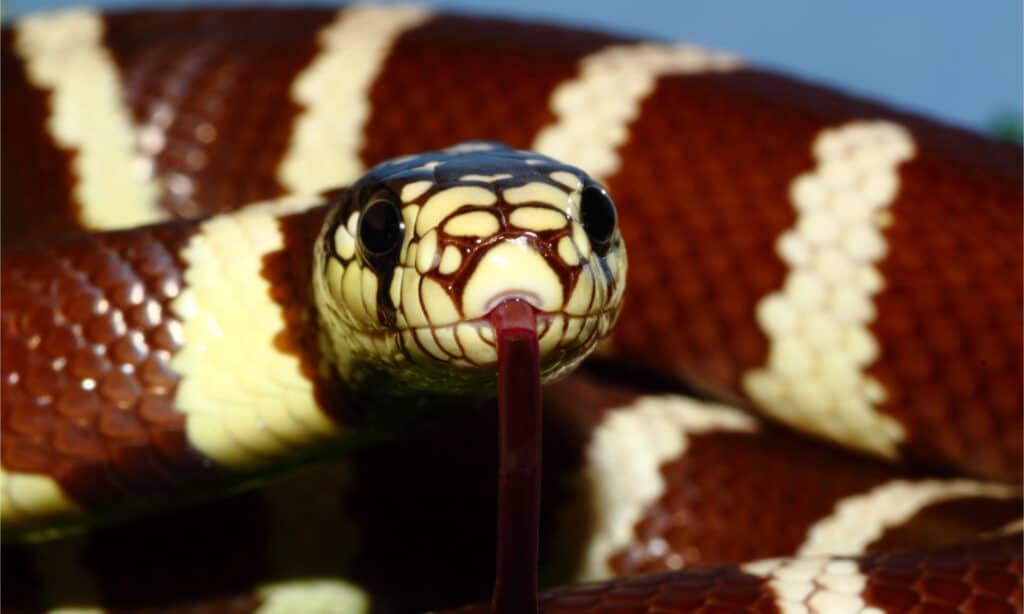
California kingsnakes are non-venomous and constrict their prey to death.
©MattiaATH/Shutterstock.com
Kingsnakes are completely harmless to adults, children, and even pets. These generally curious reptiles are easy to handle which is why they are said to make great pets. They are also found in a variety of colors and patterns. As voracious feeders, they even have a preference for eating venomous snakes, like rattlesnakes and copperheads. This preference is why they are also a favorite of many homeowners who enjoy having them traveling through their yards.
Additionally, as they are known to curb rodent populations and provide food to birds of prey, kingsnakes are thought to be a valuable contribution to both ecology and conservation. It is important to remember that they are still wild animals and should be left alone, even as a pet. While they are not aggressive, or venomous, they can, and will, bite if they feel threatened. Their bites aren’t very painful and will only cause mild swelling at the bite site, unless allergic.
The photo featured at the top of this post is © Matt Jeppson/Shutterstock.com
Discover the "Monster" Snake 5X Bigger than an Anaconda
Every day A-Z Animals sends out some of the most incredible facts in the world from our free newsletter. Want to discover the 10 most beautiful snakes in the world, a "snake island" where you're never more than 3 feet from danger, or a "monster" snake 5X larger than an anaconda? Then sign up right now and you'll start receiving our daily newsletter absolutely free.
Thank you for reading! Have some feedback for us? Contact the AZ Animals editorial team.




